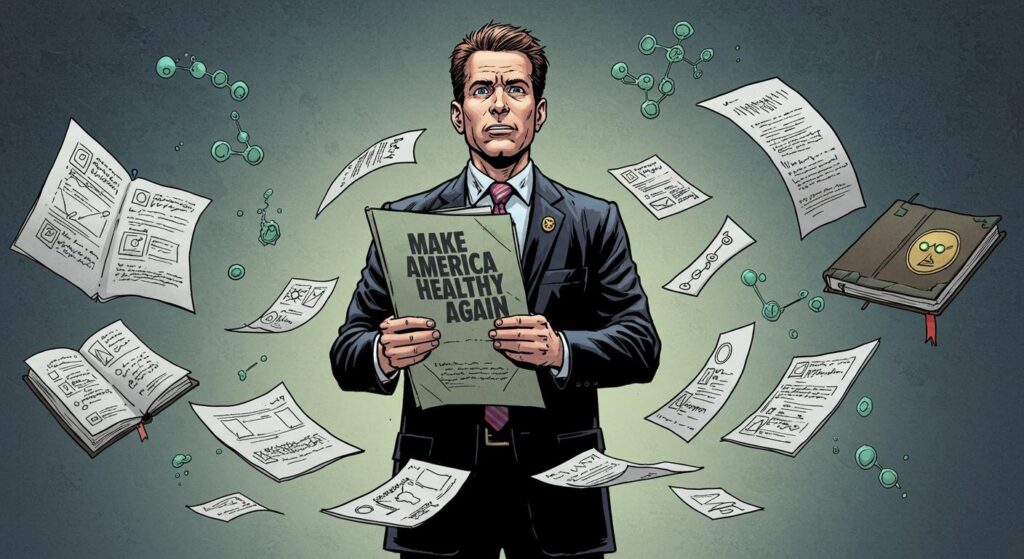Every now and then, a public official offers up an idea so unexpected, so distinctly zigging-where-others-zag, that it belongs in a scrapbook for later consideration—or occasional, gentle bemusement. This week, the U.S. found a fresh entry as The Express detailed FDA Commissioner Marty Makary’s proposition that cooking classes, rather than insulin, might represent the prescription of the future for diabetics.
A Recipe for Revolution—Or Just a New Recipe Book?
Makary appeared on Fox News’ Sunday Futures with the suggestion, quoted by both The Express and The Daily Beast, that, “Maybe we need to treat more diabetes with cooking classes, not just throwing insulin at people.” Adding to the theme, Makary claimed that scientists have “been waving the flag for years,” urging closer attention to the scientific data around lifestyle changes and lamenting that the medical establishment has become disconnected. In reporting these remarks, The Express also points out Makary’s reputation as a COVID-19 vaccine skeptic and his enthusiasm for more preventive, less pharmacological approaches to health.
Notably, Makary promoted a newly released report from the Make America Healthy Again Commission, originally created under the Trump administration. The Express recounts Makary expressing excitement: “I could not be more excited about the report,” he said, describing it as “a fresh new approach that really calls for a transformation of our healthcare system from a reactionary system to a proactive system.” The report itself calls for wide-ranging investigations into potential threats to children’s health—spanning chemicals, vaccine concerns, and, more generally, a shift in focus away from reactive medicine.
But how well does all this slot into the actual treatment of diabetes?
Science vs. Sauté
The American Diabetes Association, as cited in reporting from both outlets, recommends diet as a core part of diabetes management, but medical consensus for more than a century has made it clear: insulin is a safe, effective, and, for many, utterly irreplaceable form of treatment. Particularly for people with type 1 diabetes, insulin isn’t optional; it’s a requirement for life, since their bodies produce none on their own—a point underscored in The Daily Beast’s account highlighting repeated scientific studies and standard professional guidance.
Yet despite the evidence, the idea that diabetics might one day swap an insulin prescription for a lasagna tutorial was presented with unmistakable gusto. Are we actually meant to imagine that an omelet could substitute for a hormone therapy? The Express acknowledges that while medical professionals endorse improved eating habits as part of glucose control, insulin has remained the linchpin—without which, outcomes would be dire for a large swath of patients.
It’s an open question whether the FDA’s rhetorical pivot toward recipe books represents genuine policy intrigue or organizational dinner theater. After all, when it comes to medically managed chronic diseases, when does a little kitchen confidence ever substitute for hands-on, evidence-based care?
The Pattern of the Peculiar
Makary’s comments emerge from an administration already known for its preference for unconventional—sometimes controversial—takes on health policy. As The Daily Beast reports, Health and Human Services Secretary Robert F. Kennedy Jr. is credited as the driving force behind the Make America Healthy Again initiative, bringing attention to perceived health threats ranging from food dyes to vaccines. Earlier in The Express report, Kennedy’s history of questioning vaccination safety and promoting discredited links between vaccines and autism are discussed—positions that have drawn widespread and ongoing criticism from scientists.
Beyond vaccines, Kennedy, according to The Daily Beast, has pressured agencies to review FLUORIDE in public water supplies due to claims (unfounded by mainstream science) about links to cancer and neurological harm. The outlet also notes his push for removing synthetic dyes from foods, a project that, while colorful, again focuses on a science-averse brand of wellness advocacy. Given this backdrop, Makary’s kitchen-centric prescription seems more like a natural extension than an outlier.
All of which raises a curious pattern: is America’s health future shaped less by lab results and more by lifestyle branding? How do we reconcile energetic calls for “proactive” care with the reality that, for many conditions, “proactive” still involves prescription drugs at the core?
Beyond Satire, Into Policy
There’s something undeniably funny about the image—a doctor handing a patient with unstable blood sugar a whisk instead of a vial. But as The Express concludes in its overview, the stakes for millions of diabetics are serious. For those dependent on insulin, replacing medication with menu planning is not merely a quirky idea; it veers dangerously close to disregarding established standards of care.
Naturally, no one is denying that a more food-literate America might offer benefits. But is the cookbook really a universal, or even practical, lifeline? What’s the risk in promoting a narrative that suggests kitchen renovations could replace the pharmacy, especially when past precedent suggests we’re far more likely to see a new line of celebrity-endorsed soufflé pans than a reduction in diabetes-related emergencies?
Perhaps the next great medical revolution won’t be televised, but stream live from a demonstration kitchen. If so, what’s on tonight’s menu—insulin à la mode, or another helping of wishful thinking with a garnish of controversy?







